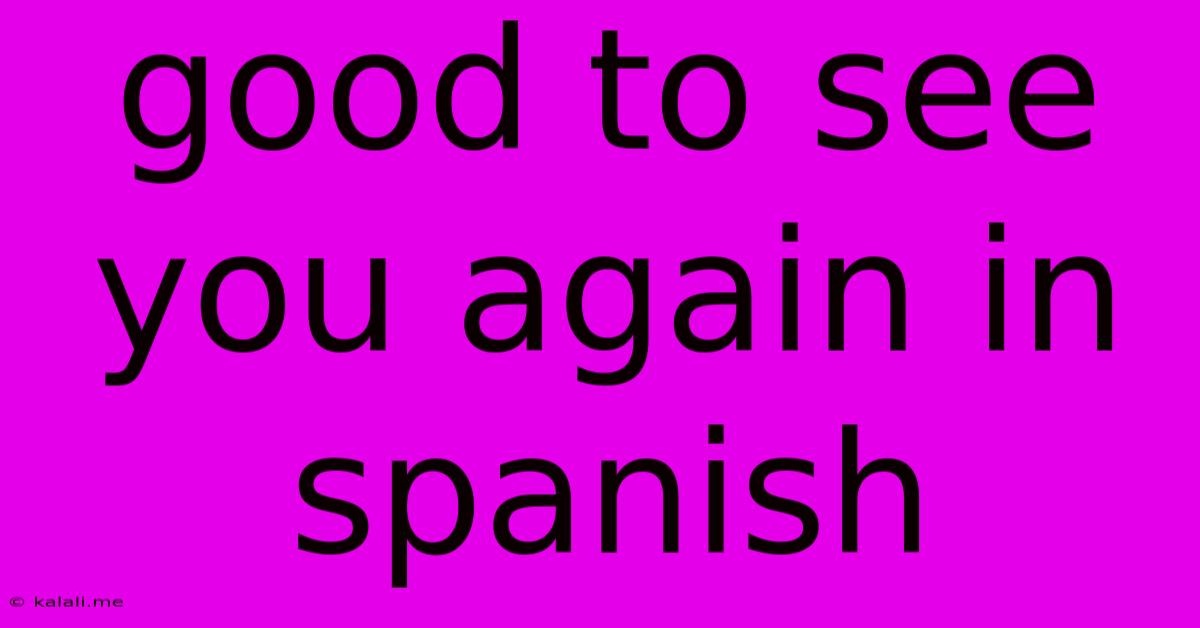Good To See You Again In Spanish
Kalali
Jun 04, 2025 · 3 min read

Table of Contents
Good to See You Again in Spanish: Mastering the Nuances of Reunion Greetings
So, you're about to reunite with someone you haven't seen in a while? Knowing how to greet them warmly and appropriately in Spanish is key to making a positive first impression. This article explores various ways to say "good to see you again" in Spanish, taking into account different levels of formality and relationship dynamics. We'll cover the most common phrases, delve into their nuances, and offer some helpful context to ensure you choose the perfect greeting for every situation.
Common Ways to Say "Good to See You Again" in Spanish
The most straightforward translation of "good to see you again" in Spanish is "Qué bueno verte de nuevo." This phrase is generally suitable for most situations and conveys a friendly and welcoming tone. However, Spanish, like any language, offers a richness of expression that goes beyond simple translations.
Here are some alternative ways to express the same sentiment, categorized for clarity:
Formal Greetings:
- "Mucho gusto en volver a verle/la." (Formal; used for someone you've met before but haven't seen in a long time. Use "le" for a man and "la" for a woman.) This translates to "It's a pleasure to see you again." This emphasizes the pleasure of the reunion, rather than simply acknowledging it.
- "Es un placer volver a verlo/la." (Formal; similar in meaning to the above, slightly more concise). Again, use "lo" for a man and "la" for a woman.
- "Encantado/a de volver a verle/la." (Formal; expresses delight in seeing the person again; use "encantado" for a male speaker and "encantada" for a female speaker). This option adds a touch of enthusiasm.
Informal Greetings:
- "Qué gusto verte de nuevo." (Informal; a more relaxed version of "Qué bueno verte de nuevo.") This is perfect for friends and family.
- "¡Cuánto tiempo!" (Informal; literally translates to "How much time!" It's an exclamation expressing surprise and pleasure at the reunion, implying it's been a long time.) This is a very common and natural way to greet someone you haven't seen in a while.
- "¡Qué alegría verte!" (Informal; expresses joy at seeing the person; translates to "What a joy to see you!") This phrase is particularly warm and affectionate.
- "Al fin te veo!" (Informal and expressive; translates to "Finally I see you!") This conveys a sense of anticipation and relief at finally meeting again.
Choosing the Right Phrase: Context is Key
The best phrase to use depends heavily on the context:
- Consider your relationship with the person: Use formal greetings for someone you don't know well or for someone older than you or in a position of authority. Informal greetings are perfect for close friends and family.
- Consider how long it's been: For a longer absence, a more emphatic greeting like "¡Cuánto tiempo!" or "¡Qué alegría verte!" might be appropriate. For a shorter absence, a simpler "Qué gusto verte" might suffice.
- Consider the overall tone of your interaction: If you want to convey strong positive emotions, choose a more enthusiastic phrase.
Beyond the Greeting: Keeping the Conversation Flowing
After your greeting, remember to follow up with a few more conversational points to show genuine interest and keep the conversation flowing. Ask how they are doing, mention something specific you remember about your last meeting, or find a common interest to discuss.
Mastering these various expressions will help you navigate social situations with confidence and grace, making your reunions even more meaningful. So, the next time you see someone you haven't seen in a while, choose the perfect phrase to express your joy and appreciation for the reunion!
Latest Posts
Latest Posts
-
Move Files From Subfolders To One Folder Terminal
Jun 06, 2025
-
Hopw To Fix Iphone Overhear Every 2 Minutes
Jun 06, 2025
-
How Long Does It Take To Grow Sugar Cane
Jun 06, 2025
-
When Someone Gives Multiple Answers To One Question Meaning
Jun 06, 2025
-
Throttle Linkage Kohler Carburetor Linkage Diagram
Jun 06, 2025
Related Post
Thank you for visiting our website which covers about Good To See You Again In Spanish . We hope the information provided has been useful to you. Feel free to contact us if you have any questions or need further assistance. See you next time and don't miss to bookmark.